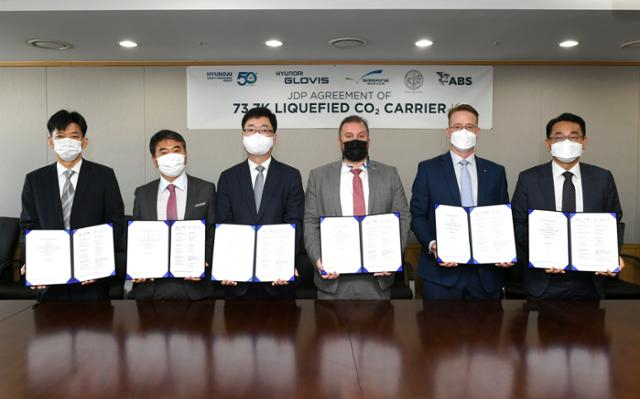South Korea’s shipbuilding giant Hyundai Heavy Industries Group and shipping company Hyundai Glovis Co. have joined forces to develop the world’s largest liquefied carbon dioxide (LCO
2) carrier targeting the fast-growing global carbon capture, utilization and storage (CCUS) market.
The group said on Monday its two shipbuilding subsidiaries, Korea Shipbuilding & Offshore Engineering Co. (KSOE) and Hyundai Heavy Industries Co., signed an agreement with Hyundai Glovis, ship management firm G-Marine Service Co., American Bureau of Shipping (ABS) and the Republic of the Marshall Islands for joint development of a 74,000-cubic-meter LCO
2 carrier.
Accordingly, the two shipbuilders, Hyundai Glovis and G-Marine Service will complete the carrier development in the second half of this year. After then, the firms will start the verification process for the vessel design's safety and suitability based on the International Maritime Organization (IMO)’s International Code of the Construction and Equipment of Ships Carrying Liquefied Gases in Bulk (IGC Code).
The Marshall Islands, a hub for international shipping and vessel registries, will advise on creating standards for the new ship design, a Hyundai Heavy Industries official told The Korea Economic Daily. ABS, a marine assets classification service provider, will certify the new ship after quality assessments, the official added.
The new ship will include nine tankers and will embed liquefied natural gas (LNG) engines in response to environmental regulations in the maritime industry. Hyundai Glovis and G-Marine Service will provide know-how on marine transport, shipping and vessel management.
Hyundai Heavy Industries Group won an approval in principle (AiP), which certifies the quality and safety of offshore assets, from Norway’s leading ship classification body Det Norske Veritas (DNV) for a CO
2 injection platform in August 2021. In the following month, the group won an AiP for its 40,000-cubic-meter LCO
2 carrier from DNV and another AiP from ABS for a 20,000-cubic-meter LCO
2 carrier. The two leading certifiers' quality approvals stepped up Hyundai Heavy Industries' LCO
2 shipping capabilities, the Korean shipbuilding group said.
The global CCUS market is expected to see more than 30% annual growth and growing demand for LCO
2 carriers, Hyundai Heavy Industries said. According to International Energy Agency (IEA) Roadmap to Net Zero, the sector is set to grow to 7.6 billion tons of LCO
2 per year by 2050.
Write to Kyung-Min Kang at
kkm126@hankyung.comJihyun Kim edited this article.





